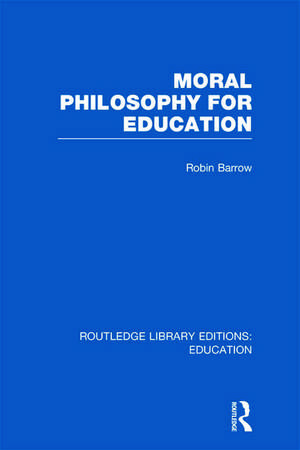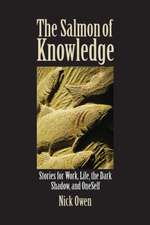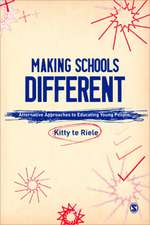Moral Philosophy for Education (RLE Edu K): Routledge Library Editions: Education
Autor Robin Barrowen Limba Engleză Hardback – 8 dec 2011
Din seria Routledge Library Editions: Education
-
 Preț: 379.48 lei
Preț: 379.48 lei -
 Preț: 400.93 lei
Preț: 400.93 lei -
 Preț: 377.09 lei
Preț: 377.09 lei -
 Preț: 379.00 lei
Preț: 379.00 lei -
 Preț: 401.28 lei
Preț: 401.28 lei - 8%
 Preț: 375.32 lei
Preț: 375.32 lei - 18%
 Preț: 1298.07 lei
Preț: 1298.07 lei - 34%
 Preț: 819.90 lei
Preț: 819.90 lei - 26%
 Preț: 247.40 lei
Preț: 247.40 lei - 34%
 Preț: 819.90 lei
Preț: 819.90 lei - 34%
 Preț: 819.90 lei
Preț: 819.90 lei - 34%
 Preț: 819.90 lei
Preț: 819.90 lei - 34%
 Preț: 991.00 lei
Preț: 991.00 lei - 34%
 Preț: 822.76 lei
Preț: 822.76 lei - 34%
 Preț: 821.53 lei
Preț: 821.53 lei - 26%
 Preț: 259.98 lei
Preț: 259.98 lei - 34%
 Preț: 764.20 lei
Preț: 764.20 lei - 34%
 Preț: 819.90 lei
Preț: 819.90 lei - 34%
 Preț: 761.85 lei
Preț: 761.85 lei - 34%
 Preț: 986.91 lei
Preț: 986.91 lei - 55%
 Preț: 541.50 lei
Preț: 541.50 lei - 34%
 Preț: 762.01 lei
Preț: 762.01 lei - 25%
 Preț: 261.37 lei
Preț: 261.37 lei - 34%
 Preț: 764.20 lei
Preț: 764.20 lei - 34%
 Preț: 762.97 lei
Preț: 762.97 lei - 34%
 Preț: 819.90 lei
Preț: 819.90 lei - 34%
 Preț: 986.91 lei
Preț: 986.91 lei - 34%
 Preț: 821.53 lei
Preț: 821.53 lei - 34%
 Preț: 819.90 lei
Preț: 819.90 lei - 34%
 Preț: 819.90 lei
Preț: 819.90 lei - 34%
 Preț: 821.13 lei
Preț: 821.13 lei - 34%
 Preț: 2100.27 lei
Preț: 2100.27 lei - 34%
 Preț: 819.90 lei
Preț: 819.90 lei - 34%
 Preț: 819.90 lei
Preț: 819.90 lei - 34%
 Preț: 764.20 lei
Preț: 764.20 lei - 34%
 Preț: 819.90 lei
Preț: 819.90 lei - 34%
 Preț: 986.91 lei
Preț: 986.91 lei - 34%
 Preț: 764.20 lei
Preț: 764.20 lei - 34%
 Preț: 819.90 lei
Preț: 819.90 lei - 34%
 Preț: 4048.76 lei
Preț: 4048.76 lei - 34%
 Preț: 736.38 lei
Preț: 736.38 lei - 34%
 Preț: 819.90 lei
Preț: 819.90 lei - 34%
 Preț: 821.53 lei
Preț: 821.53 lei - 34%
 Preț: 819.90 lei
Preț: 819.90 lei - 34%
 Preț: 819.90 lei
Preț: 819.90 lei - 34%
 Preț: 819.90 lei
Preț: 819.90 lei - 34%
 Preț: 819.90 lei
Preț: 819.90 lei - 34%
 Preț: 819.90 lei
Preț: 819.90 lei
Preț: 819.90 lei
Preț vechi: 1239.36 lei
-34% Nou
Puncte Express: 1230
Preț estimativ în valută:
156.90€ • 162.88$ • 130.83£
156.90€ • 162.88$ • 130.83£
Carte tipărită la comandă
Livrare economică 25 martie-08 aprilie
Preluare comenzi: 021 569.72.76
Specificații
ISBN-13: 9780415689427
ISBN-10: 0415689422
Pagini: 216
Dimensiuni: 156 x 234 mm
Greutate: 0.45 kg
Ediția:1
Editura: Taylor & Francis
Colecția Routledge
Seria Routledge Library Editions: Education
Locul publicării:Oxford, United Kingdom
ISBN-10: 0415689422
Pagini: 216
Dimensiuni: 156 x 234 mm
Greutate: 0.45 kg
Ediția:1
Editura: Taylor & Francis
Colecția Routledge
Seria Routledge Library Editions: Education
Locul publicării:Oxford, United Kingdom
Public țintă
General, Postgraduate, Professional, and UndergraduateCuprins
Introduction. Part 1 1. Philosophy and Education 2. Moral Philosophy Part 2 3. Reasonable and Unreasonable Arguments 4. Freedom 5. Equality 6. Utilitarianism Part 3 7.Kant and Respect for Persons 8. Autonomy 9. Rights 10. Creativity 11. What Is Worthwhile? 12. The Free School 13. Educational Distribution 14. Indoctrination and Moral Values. Index.
Descriere
Teachers and students are frequently confused as to the relevance of abstract philosophical theorising to the reality of the classroom and this book is distinctive for the attention it devotes to philosophy and its potential contribution to practical matters, and education in particular. The author is critical of many current views of the philosophy of education and argues the validity of philosophy as an integral part of education in its own right, against the creation of a ‘new’ branch of philosophy, the ‘philosophy of education’. The book stresses that relativist ethical theories are no more ‘known’ to be valid than the absolutist theories they have replaced, and in the second section the author argues for a modified utilitarian position. The final section enables the reader to relate the general argument of the second part to several specific issues.












